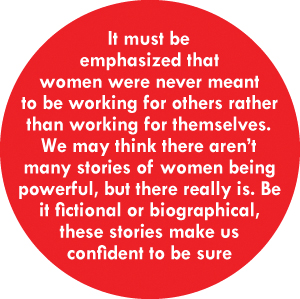
A woman is like a book for most of society. Judged by the cover, regardless of how the story would be, women were and sometimes are still birds locked in the cage.
It must be emphasized that women were never meant to be working for others rather than working for themselves. We may think there aren’t many stories of women being powerful, but there really is. Be it fictional or biographical, these stories make us confident to be sure. During the 18th and 19th centuries women were expected to be married at the tender age of 17 or even 16.
With the society that prevailed during the time females were expected to stay silent, even though some didn’t stand this. They started to fight back in various ways, some wrote, some spoke.
Various themes
‘The Widow’s Might’ is one such fictional story that has made a remarkable mark in today’s literature.
Written by humanist as well as famous author Charlotte Perkins Gilman, who was famous for her short novel ‘The Yellow Newspaper’, this tale consists of a family gathering towards the end of the usual event.
 The short story defines certain themes like independence and freedom of women. Often understood with the title it may seem clear that the piece leads to feminism. “The Widow’s Might” simply puts effort into the subject that widows aren’t supposed to be pushed apart, simply because their man had died. In those years of the world widows were considered weaker than married women. Perkins defies these through using a brave move by making a widow that is the main highlight of the story.
The short story defines certain themes like independence and freedom of women. Often understood with the title it may seem clear that the piece leads to feminism. “The Widow’s Might” simply puts effort into the subject that widows aren’t supposed to be pushed apart, simply because their man had died. In those years of the world widows were considered weaker than married women. Perkins defies these through using a brave move by making a widow that is the main highlight of the story.
The plot opens with the children of the McPherson family discussing property after their father’s death, a normal scenario. The author states that McPherson’s include three children namely James, Ellen and Adelaide. Within the first paragraph we can see that James isn’t really enthusiastic regarding the family. Hints were given by the fact that James’s wife had not wanted to attend the father’s funeral and neither did he persuade her to, she slid by climatic differences saying that she never liked to travel to Denver in November for a funeral.
Casting James aside the two daughters attended it as “Duty” alone without each other’s respective husbands. As per my opinion “Duty” clearly isn’t the word that suits this, they are not really sympathetic about their father’s demise.
Ellen and Adelaide participated like employees at the CEO’s death, they were neither sad nor happy. Yet again it shows sarcasm, they love their father for the monetary value. Rather than attending the procession they are here to discuss the property.
The next thing the siblings talk about is who and how they will take care of the old aged mother. They go on with pushing her into each other’s responsibility, finally with the two sisters trying to push her into the brother’s duty.
It’s justified that the kids didn’t show any gratitude to their mother who wasted her good life for them, “What are we going to do with Mother?” they treat her like an object, most probably like a vase that lost its flowers. “Things cost awfully in these days”. This quotation makes it feel that they aren’t willing to spend money on their old, fragile mother.
“..That is often true, But it depends”, this scene is when the two girls calmly turn towards their brother and explain that a mother normally prefers son’s more than daughter’s, But James here gives a peek at a dependency, once again it’s often about his wife. Perkins’s explicit that by marital affairs certain conflicts can be aroused, here as well what we see is that tug of war among the mother and daughter-in-law, a common war that leads to divorce possibly.
Wired
It’s funny to think that today’s society has a handful of families like the McPhersons. Maybe with today’s technology the relationships between members are wired, meaning they don’t interact much. But in my perspective Mrs. McPherson is actually disregarded by her children throughout her life with them.
With the sensitive question of how to cope with ‘Mother’, the so-called adults reveal that they never were indeed close. It’s when Ellen mesmerizes how she hated to live there “How did I hate to live here”.
It’s possible they weren’t happy during their childhood, mainly with their father, whose death they aren’t mourning for. As the discussion proceeds, they are interrupted by Mr. Frankland’s arrival there. Mr.Frankland is the lawyer of Mr.McPherson. His arrival with the will makes the children rise on adrenaline, they are excited not knowing how much they will see by the testimony. Happy with the lawyers coming, they call their mother to come for the will reading. And Yes, that’s where the protagonist steps in for a climax.
Their mother doesn’t show any interest in the friendly lawyer’s attendance, therefore, the McPherson children step in and welcome the lawyer to sit down. The lawyer begins “The estate was left to be divided among the children in four equal portions, two for the son and one for each daughter…” as the will goes on to the end. James takes it to the end saying, “There’s an end to all that now” not long enough after this is said, the mother enters to say, “…I didn’t come to hear that old will. It’s no good now.”. Astonished, all of them turn their chairs to listen to her.
Well, behold the new will, the property owned by her husband had been transferred to his wife 3 years ago in a time of chaos. With this information the three humans try to lure their mother to a trap. “Well, mother, this does complicate matters a little”.
Of course it does, readers would think she is inconsiderate, not caring etc. Even though she did it with reasons that are understood at the end. The Children try to persuade Mrs.McPherson by using different elements. With no luck, they question her motive of doing it.
As the Mother explains when thoroughly inquired by the lawyer, “I have considered Mr. McPherson’s wishes for thirty years…Now I’ll consider my own, I have done my duty since the day I married him.”. Simple but deep, her vow is plenty for today’s woman, she took her freedom, she did her “Duty”.
The writer explains throughout this that she wasn’t clearly happy within the marriage. She lists her duties, with references to women’s work load. Then Mr. Frankland questions about her ‘children’ for which she answers with a gist of revenge. “I have no children. I have two daughters and a son…I did my duty by then and they did their duty be me…and would yet, no doubt”. She had done her part, She had finished her duty as a mother. It’s now her chance for escape.
Felt caged
She details her struggle of how she felt caged, whereas none of the children cared to look. She reasons that she too needs a life, having nothing in the first twenty, than spending the rest thirty for the family, she now has thirty more to live.
Mrs. McPherson’s idea came out very clearly in this way. “I’m a stronger women today than I was ever in my life”. Her excitement swiftly explains how she is going to plan out the remaining for herself. At the end she highlights “…But it doesn’t matter any more. Thirty years I’ve given you-and your father. Now I’ll have thirty years of my own.”
When genuinely asked by the son where she plans to go, Mother replies with locations all over the world, pointing out the desire of travelling around the world. Finished with the settlement “They separated that night-three going East, one West”.
Financial independence
Charlotte’s story amplifies a lot more than to be known, in today’s world we see working women financially independent. However, in those days it wasn’t. They were responsible for everything, the household and taking care of members etc.
 Many mothers are expected to take care of the children even after their marriages, nonetheless Mrs.McPherson was varied. She did her ‘duty’ with no crumbs left, she demanded her freedom, or else earned it by herself. Mother planned it all out, you would think how indecent or incompatible she is, anyways it doesn’t matter she did it good.
Many mothers are expected to take care of the children even after their marriages, nonetheless Mrs.McPherson was varied. She did her ‘duty’ with no crumbs left, she demanded her freedom, or else earned it by herself. Mother planned it all out, you would think how indecent or incompatible she is, anyways it doesn’t matter she did it good.
She isn’t wrong is because, she was never treated right, but she treated them all great. As a lady, her ought to give everything for her husband and family is indescribable, yet her not receiving anything back doubts around gratitude. Herself wasn’t given a slightest respect even, she was just an object, a robot fulfilling the wishes.
Mrs. McPherson is a huge example to today’s culture by bringing the theme of freedom into the story. Her throwing her black veil symbolizes her stepping into a new world of independence. Perkins also takes advantage of white, using it as her outfit colour, once again resembling her free nature. Nevertheless the use of “Duty” throughout the tale demands how much they care less of their faithful human being ‘Mother’. As a boomerang Mrs. McPherson uses it back to show that they too were her duty, giving them a taste of their own medicine.
Something that makes the reader a bit more suspicious about is the relation of Mr and Mrs McPherson. As mentioned before it is possibly an arranged marriage, where neither enjoyed. The father can be recalled by the children as a cold person to whom none of them showed much liking.
The wife’s lack of emotion to the husband is well evident in the ‘Widow’s Might’. She was a rebellious woman, intelligent, who took the chance of his death to escape everything. Crystal it is that she didn’t merely enjoy her life with him. So by this she wasn’t actually who made the bed sleeping in it, it was himself as seen.
The writer also takes into fact by giving off small details, for example, the son getting more shares than the two daughters, showing how much they were cared less in society. It points to the fact that male chauvinism prevailed at the time of writing.
‘The Widow’s Might’ emphasizes the topic of female freedom and independence, which are the primary themes of this short story. Based on it’s plot, techniques used in the story is the best stance in today’s literature.
Charlotte being a best novelist of the time, as well as a feminist has tried to point out that women were never dared to wear black for lifetime after the death of her man, they were more largely granted freedom to sir down and consider themselves rather than mourn over someone else. This story remarkably has placed it in a module of how women are to be shaped into. Therefore, making a mark on women. It has also become an unforgettable short story for me which has captured me in full.
In this tale the mother was a zombie or a machine working constantly according to orders. It gives advice to many youths to treat the person that gave them life, with respect unlike these children.
The moral of this story will never cease a person no matter what happens. Women were meant to be free not like caged animals at circuses that are commanded, and if they are you would never know when the lion will start to roar.
The story isn’t only for women, but for anyone without gender specifications, it teaches to live for yourself. It also teaches that “Freedom is being you without others permission”.
